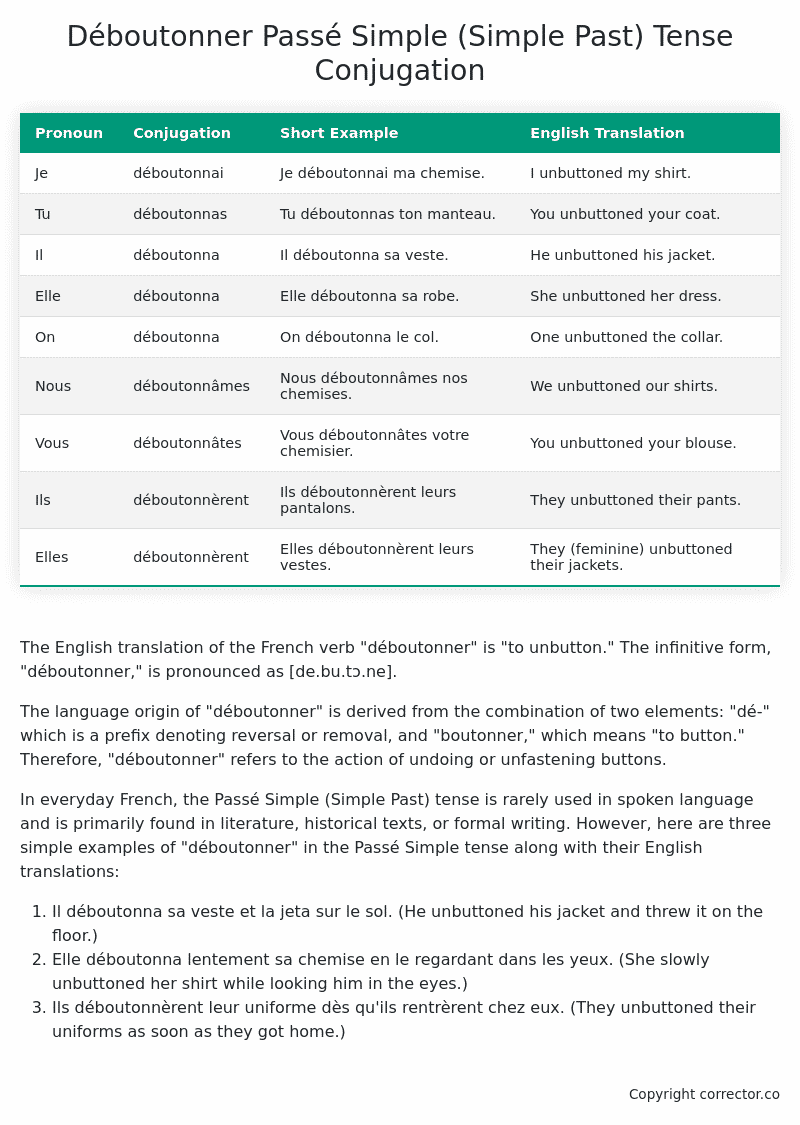Passé Simple (Simple Past) Tense Conjugation of the French Verb déboutonner
Introduction to the verb déboutonner
The English translation of the French verb “déboutonner” is “to unbutton.” The infinitive form, “déboutonner,” is pronounced as [de.bu.tɔ.ne].
The language origin of “déboutonner” is derived from the combination of two elements: “dé-” which is a prefix denoting reversal or removal, and “boutonner,” which means “to button.” Therefore, “déboutonner” refers to the action of undoing or unfastening buttons.
In everyday French, the Passé Simple (Simple Past) tense is rarely used in spoken language and is primarily found in literature, historical texts, or formal writing. However, here are three simple examples of “déboutonner” in the Passé Simple tense along with their English translations:
- Il déboutonna sa veste et la jeta sur le sol. (He unbuttoned his jacket and threw it on the floor.)
- Elle déboutonna lentement sa chemise en le regardant dans les yeux. (She slowly unbuttoned her shirt while looking him in the eyes.)
- Ils déboutonnèrent leur uniforme dès qu’ils rentrèrent chez eux. (They unbuttoned their uniforms as soon as they got home.)
Table of the Passé Simple (Simple Past) Tense Conjugation of déboutonner
| Pronoun | Conjugation | Short Example | English Translation |
|---|---|---|---|
| Je | déboutonnai | Je déboutonnai ma chemise. | I unbuttoned my shirt. |
| Tu | déboutonnas | Tu déboutonnas ton manteau. | You unbuttoned your coat. |
| Il | déboutonna | Il déboutonna sa veste. | He unbuttoned his jacket. |
| Elle | déboutonna | Elle déboutonna sa robe. | She unbuttoned her dress. |
| On | déboutonna | On déboutonna le col. | One unbuttoned the collar. |
| Nous | déboutonnâmes | Nous déboutonnâmes nos chemises. | We unbuttoned our shirts. |
| Vous | déboutonnâtes | Vous déboutonnâtes votre chemisier. | You unbuttoned your blouse. |
| Ils | déboutonnèrent | Ils déboutonnèrent leurs pantalons. | They unbuttoned their pants. |
| Elles | déboutonnèrent | Elles déboutonnèrent leurs vestes. | They (feminine) unbuttoned their jackets. |
Other Conjugations for Déboutonner.
Le Present (Present Tense) Conjugation of the French Verb déboutonner
Imparfait (Imperfect) Tense Conjugation of the French Verb déboutonner
Passé Simple (Simple Past) Tense Conjugation of the French Verb déboutonner (You’re reading it right now!)
Passé Composé (Present Perfect) Tense Conjugation of the French Verb déboutonner
Futur Simple (Simple Future) Tense Conjugation of the French Verb déboutonner
Futur Proche (Near Future) Tense Conjugation of the French Verb déboutonner
Plus-que-parfait (Pluperfect) Tense Conjugation of the French Verb déboutonner
Passé Antérieur (Past Anterior) Tense Conjugation of the French Verb déboutonner
Futur Antérieur (Future Anterior) Tense Conjugation of the French Verb déboutonner
Subjonctif Présent (Subjunctive Present) Tense Conjugation of the French Verb déboutonner
Subjonctif Passé (Subjunctive Past) Tense Conjugation of the French Verb déboutonner
Subjonctif Imparfait (Subjunctive Imperfect) Tense Conjugation of the French Verb déboutonner
Conditionnel Présent (Conditional Present) Tense Conjugation of the French Verb déboutonner
Conditionnel Passé (Conditional Past) Tense Conjugation of the French Verb déboutonner
Conditionnel Passé II (Conditional Past II) Tense Conjugation of the French Verb déboutonner
L’impératif Présent (Imperative Present) Tense Conjugation of the French Verb déboutonner
L’impératif Passé (Imperative Past) Tense Conjugation of the French Verb déboutonner
L’infinitif Présent (Infinitive Present) Tense Conjugation of the French Verb déboutonner
L’infinitif Passé (Infinitive Past) Tense Conjugation of the French Verb déboutonner
Le Participe Présent (Present Participle) Tense Conjugation of the French Verb déboutonner
Le Participe Passé (Past Participle) Tense Conjugation of the French Verb déboutonner
Struggling with French verbs or the language in general? Why not use our free French Grammar Checker – no registration required!
Get a FREE Download Study Sheet of this Conjugation 🔥
Simply right click the image below, click “save image” and get your free reference for the déboutonner Passé Simple tense conjugation!

Déboutonner – About the French Passé Simple (Simple Past) Tense
Formation
Usage
Narration
Historical Context
Interactions with other tenses
Passé Composé
Imparfait
Conditional and Subjunctive
Summary
I hope you enjoyed this article on the verb déboutonner. Still in a learning mood? Check out another TOTALLY random French verb conjugation!


